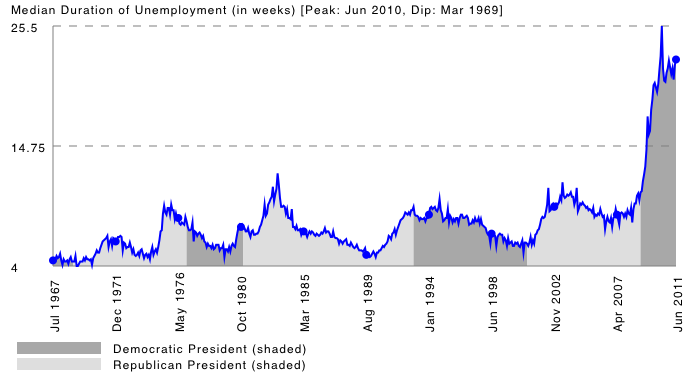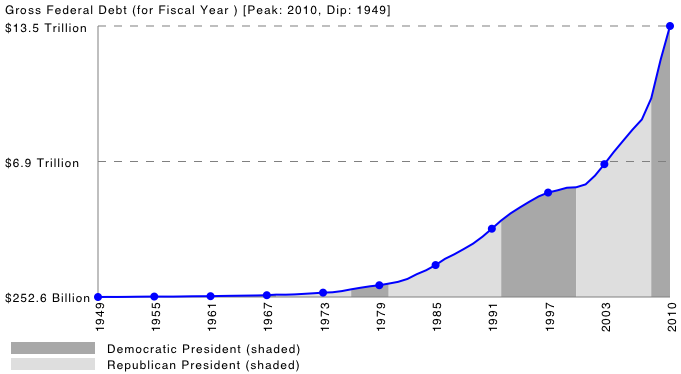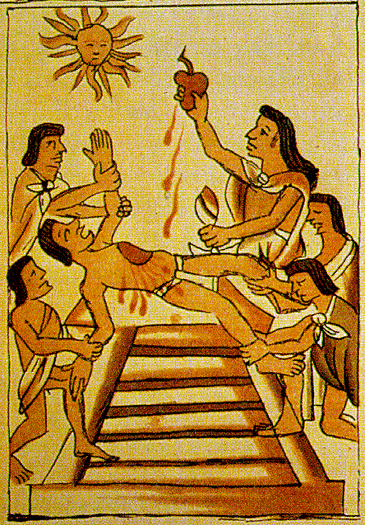Close window | View original article
The Weatherman, the President, Virgin Sacrifice, and Communists
Presidents don't actually control everything.
Sometimes, it pays to tune out the sound and fury of domestic politics and get back to discussing basics such as the well-oiled, finely-honed system we've worked out for managing our weather.
When the TV weatherman brings us sunny weather we like, his approval ratings shoot up. When he brings snowy or rainy weather we don't like, his polls plummet.
When the weather's really bad, we fire the weatherman. Sure enough, after a few days or weeks, the weather gets back to what we want. We all know from years of experience that firing the weatherman has a positive effect on the weather.
Throw the Rascals Out?
American voters fire the President whenever the economic weather's bad. Sure enough, the economy usually gets better after we fire the weatherman. At least it seems to, but here's a graph, drawn from government data, which shows that unemployment lengths grow and shrink almost regardless of who's in office on any given day. Any trends are visible only in the very long term.

Is it possible that the all the sound and fury is misplaced? Could it be that the President or his party doesn't really matter much, or at least not very quickly?
There is one area where the President and his party make a significant difference - debt! The second graph shows that Presidential inclinations have an effect on how much money we owe.

Some of us are convinced that owing too much will bring bad weather. Time to fire the weatherman?
Sacrificing Virgins?
Archaeological analysis of mummified bodies of sacrificial victims suggests that the Mayans sacrificed virgins at an appropriate time during the winter to ensure that spring would come when desired. This must have been more effective than our habit of firing the weatherman because spring comes more faithfully than good weather.
Suppose you're the official in charge of the sacrifice. It works! In response to your solemn efforts, spring comes right when it should.
All of a sudden one of the candidates charms you. You see immediately that there are better outlets for this young lady's talents and human potential than serving as the annual sacrifice. What do you do about this insight?
You suspect that spring will come no matter what you do, but you don't know all that much about how cosmology or astronomy really work. Suppose you cancel the sacrifice or substitute a less-bodacious virgin and spring doesn't come on time? Occasionally that happens. The enraged populace will sacrifice you, because you're the bumbling clown whose neglect of duty made spring not come.
American voters sacrifice the occasional President, but we don't turn over enough of our other elected officials. Some believe that that's why economic spring doesn't come as often as it should.
On the other hand, the numerical evidence presented above suggests that spring comes whether we sacrifice politicians or not.
Placebos, Statistics, and Politics
The Food and Drug Administration requires that drug companies test new drugs very carefully, which translates to "at huge cost." Scientists randomly divide patients into two groups, one of which gets the drug and the other gets a fake drug called a placebo, without either the doctors or the patients knowing which got which. The idea is to conduct a "double blind" study so there can't be any biases.
Placebos, which are real cheap, help 60% of people who get them. The "placebo effect" is stronger if the doctor really believes that the drug will help. It's important that the doctor not know whether the patient is getting the drug or the placebo - his enthusiasm changes the result as surely as virgin sacrifice brings spring.
Some believe that "alternative medicine" works because practitioners project belief. If patients believe strongly enough, many are cured.
What if both drugs in a trial are placebos? One of them will work better than the other. Does that mean that the winning placebo is clinically effective?
This sort of statistical uncertainty means that it takes a great many patients and a great many trials to be sure that a drug is better than a placebo. This costs a lot, which is why the first pill actually sold costs a billion dollars. The pills that come afterward cost a fraction of a cent each. Everybody wants to buy the second pill; nobody wants to pay for the first pill.
Presidential Placebos
The placebo effect works in politics; it's called "public confidence." If the President tells everybody that the future is doom and gloom, so it will be. If he can convince the people that things will get better, things get better.
If a leader can convince his team that they'll win the game, their chances are better than if they think they're going to lose.
President Obama has convinced Americans that our economic prospects under his leadership are lousy. The economy won't recover as long as we believe that, or as long as we're under a leader who believes his own leadership can't fix our problems.
Everybody knows that the government shot its trillion-dollar wad and it didn't work. Everybody knows that government has failed and it's up to the private sector. Unfortunately, the private sector doesn't dare make a move for fear of being crushed with new regulations and taxes.
The most important economic act the President could take would be to convince Americans that his government will get out of the way so that the people can fix the economy.
Government Can Trash The Economy, But Not Build It
When the communists took over China in 1949, Mao chopped heads of "capitalist roaders" and "petty Bourgeois." This was more effective at reforming greedy businessmen than taxes and regulations.
The result: rich people fled, ceased to be rich, or ceased breathing. The economy tanked, leading to near-perfect Communism: everybody was equal in extreme poverty.
The Chinese lost a war with India in 1962. Mao was correct in saying that power grows out of the barrel of a gun, but he forgot that guns have to be paid for and men who carry them have to be fed. The Chinese economy couldn't support a decent military.
This wasn't because Chinese can't create jobs. Chinese run most Pacific Rim businesses in spite of affirmative action programs intended to keep Chinese from getting all the wealth. Chinese bureaucrats can stop Chinese from getting rich; others can't.
When students rebelled in Tiananmen Square in 1989, the government realized that they had to give citizens a reason to support them. It took the leadership a few years to shove the message, "To get rich is glorious" through the bureaucracy, but the Chinese miracle resulted. They went from dead broke to owning trillions of dollars worth of Treasury bonds in 30 years.
 |
| Recovery is just around the corner. |
They didn't offer subsidies. They didn't promote green boondoggles. They didn't fund research. They just got out of the way, and wealth multiplied as if by magic.
The only way Mr. Obama could make growth happen in America would be to follow the example of China's Communist(?) leadership. He needs to revive the "animal spirits" of America's entrepreneurs as the Chinese government revived the spirit of Chinese capitalism. Then he needs to convince the American people that they, and only they, can do it, that they will do it, and that our government understands that economic growth comes from the people and not from government.
Mr. Obama knows this. We know he knows because he's announced several times that he's going to ask his regulatory agencies to get rid of unneeded rules. That would help the economy if it actually happened. Unfortunately, instead of cutting back, his minions are writing job-killing rules at a record clip.
Both the way Obama walks and the way he talks are better suited to scolding and depressing than to encouraging. Maybe spring would come if Mr. Obama sacrificed a virgin or two, assuming he can find any in his circle? Better yet, let's fire the weatherman!